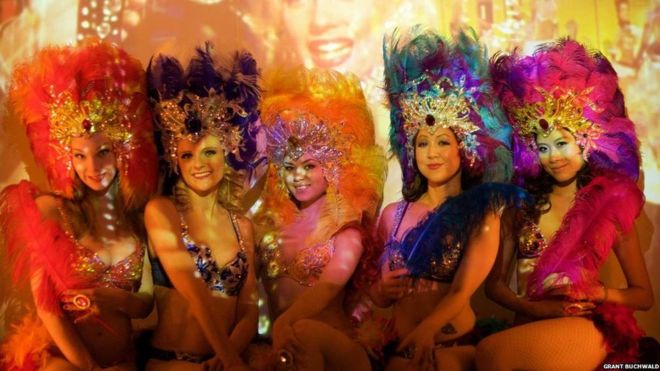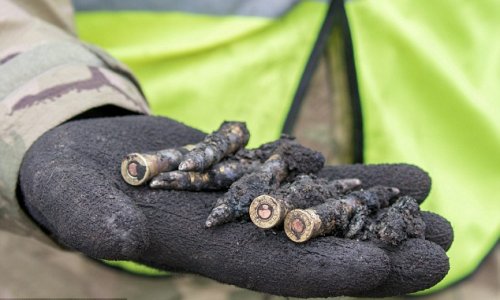If the strangeness of opening a burlesque club in China had not occurred to them as a Buddhist cleansing ceremony took place in their future venue, it certainly did when they found themselves submitting Frank Sinatra lyrics to be vetted by the local cultural department.
Amelia Kallman and Norman Gosney opened the first cabaret nightclub of its kind in Shanghai in 2010.
And the story of their rise and fall is now a stage show at the Edinburgh Fringe Festival.
"It's a cautionary tale" says Kallman. "And a love story".
She and her impresario husband and fellow performer Gosney, originally from Bristol, left New York where they had had success with a speakeasy and burlesque club to chase their fortunes in China in 2007.
"We saw China as the next big super-power and Shanghai was the next big city. We wanted to be the ice-breaker, to be the first to do this in Asia."
A former Japanese Buddhist temple built in 1931 became their three-floor venue and a chorus line of six women hired to perform a combination of burlesque, Moulin Rouge and vaudeville referencing the city's reputation as the Paris of the East in the 1920s and 1930s.
At first, the authorities were fully supportive of the endeavour, says Kallman.
"They wanted us to do it, to bring business to the district, to bring more foreigners."
There were certain hurdles to overcome first.
Shanghai already had clubs where you could find scantily-clad dancers, and officials needed assurance the dancers would comply with China's rules against public nudity.
"We were always very aware we had to respect the rules and culture.
"Everything was classy and sophisticated," adds Kallman.
Then there was the cleansing ceremony to ensure the spirits of the dead were not displeased with the former temple becoming an entertainment venue.
A plush renovation was also needed.
After two years, the club called Chinatown opened to much fanfare and officials endorsed it by bringing their friends, says Kallman.
Fridays and Saturdays were popular with foreigners and they adapted mid-week shows to particularly appeal to a Chinese audience with "half the show in Mandarin and more pratfalls," explains Gosney.
The club went on to have full houses, appeared in a programme with Piers Morgan and won an award for best new nightclub. But it was soon after that that things changed, says Kallman.
Shanghai's Cultural Department said it received a complaint.
"They sent five people one night to look at the show."
At the end of the performance, it was a section featuring Sid Vicious in homage to Malcolm McLaren who had recently died, that rankled with a female official, perhaps fearing a subversive subtext.
"The acts hadn't been previously translated and videotaped so in her eyes they were illegal because not approved by the Chinese government."
It is a requirement that has beset the top performers in the world when performing in China, including the Rolling Stones.
Kallman and Gosney found themselves having to submit translations of the lyrics of every number they were going to sing two weeks prior to show night. With new shows each week it was an arduous task.
Soon, there were arguments over the amount of midriff on show.
"We had an act with a wonderful guy in drag trying to emulate the girls. It was full of double entendres. At the end of it they [the officials] said they wanted to ban the midriff, and especially his midriff.
"It was so obviously comedic," says Gosney.
"Problems arose because we are foreigners used to saying what we think and we have art so we can express ourselves. Our freedom is ingrained in us.
"They saw that as a challenge, says Kallman.
Gosney claims bribes became commonplace, government-run banks would remove the business's credit and that charges were made up against them.
"It was the death of a thousand cuts. It became aggressive and scary," reflects Kallman.
Eventually, they say, they were tipped off that manufactured bribery charges were going to be brought against them.
"We found out they'd frozen our bank accounts. We took the money from the till and went to Bali. They raided our home, our office and the club," says Kallman.
She says they were warned they must not return to China. Back in the UK, she wrote a book about the experience, Diary of a Shanghai Showgirl - there has never been any comment on these claims.
Ultimately, Gosney thinks China has a long way to go in terms of creativity.
"If you are making toilet fittings you have to go to Shanghai but if you are doing something new they don't see how to make money out of it."
He advises anyone with similar ambitions to go to Detroit instead where they will have a fairer chance, but he concedes, "We did brilliant work there. We loved our time."
(BBC)




www.ann.az
Follow us !











